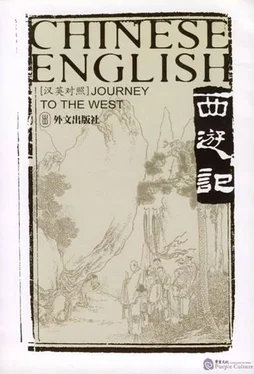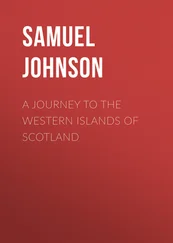The venerable elder produced it from his sleeve and handed it to Monkey, who passed it in turn to the king. “This was a letter that the demons sent his lieutenant to deliver,” Monkey said. “He was the officer I killed and brought here as a trophy. Then I turned myself into the officer and went back to the cave to report. That was how I saw Her Majesty and stole the golden bells. He almost caught me, but I did another change, stole them again, got them out and fought him. It was lucky for him that the Bodhisattva Guanyin came to collect him and tell me why you and Her Majesty were parted.”
He told the whole story from beginning to end in great detail. Everyone in the country-whether ruler or ministers, whether within the palace or outside-expressed admiration and gratitude.
“In the first place,” said the Tang Priest, “it was because of Your Majesty's own good fortune, and in the second place it was thanks to my disciple's efforts. We are deeply obliged to you for this sumptuous banquet today, and now we must take our leave of you. Please do not delay us poor monks on our pilgrimage to the West.”
When the king realized that his efforts to keep them there would be of no avail he inspected and returned the passport and arranged a great procession of royal coaches. The Tang Priest was invited to sit in his own dragon carriage, while the king, his queens and his consorts themselves all pushed it along as they saw them on their way then bade them farewell. Indeed:
He was fated to have his melancholy washed clean away:
The mind finds peace of itself when thought and worrying cease.
If you do not know what of good or ill lay in store for them on the way ahead listen to the explanation in the next installment.
The Seven Emotions Confuse the Basic in Gossamer Cave
At Filth-Cleansing Spring Pig Forgets Himself
The story tells how Sanzang took his leave of the king of Purpuria, got everything ready, saddled the horse and headed Westwards. They crossed many a mountain and river. Before they realized it autumn and winter were over and spring's brightness and charm were back. Master and disciples were enjoying the scenery as their way led them across the greenery when they suddenly noticed a building amid trees. Sanzang dismounted and stood beside the main track.
“Master,” Brother Monkey asked, “the road is easy and there is no evil about, so why have you stopped?”
“You aren't at all understanding, brother,” Pig said. “The master is feeling sleepy after being in the saddle for so long. You ought to let him come down and have a rest.”
“It's not that,” Sanzang said. “I can see a house over there. I was thinking of going there myself to beg for some food.”
“What a thing for the master to say,” said Monkey with a smile. “If you want some food I'll go and beg some for you. As the saying goes, 'Your teacher for a day is your father for the rest of your life.' It would be outrageous for me, your disciple, to sit here idly and let my master go begging.”
“There's no need to say that,” Sanzang replied. “Usually you three have to cross enormous distances as far as the eye can see to beg for our food. Today there's a house so close it's in shouting distance, so let me beg this time.”
“But, Master, you wouldn't know what to do,” said Pig. “As the saying goes, when three people go travelling it's the youngest who does the rough jobs. You're the senior one and we're all only disciples. As the old book says, 'When there is a job to be done the disciple does it.' Let me go.”
“Disciples,” said Sanzang, “the weather is good today. It's not at all like the times when you all have to go far away in wind and rain. Let me go to this house. Whether I get any food or not I shall soon be back and we shall be on our way.”
Friar Sand, who was standing beside them, smiled and said, “Stop arguing so much, brother. As the master has made his mind up you shouldn't disobey him. If you upset him he won't eat any of the food you are able to beg.”
Pig accepted this suggestion and brought out the begging bowl and a change of hat and cassock for the master, who went straight to the farm building to look at it. It really was a fine place. He could see:
A high-rising stone bridge,
Ancient trees growing close together.
Where the stone bridge rose high
A babbling brook joined a long stream;
Amid close-growing ancient trees
Hidden birds sang sweetly on the distant hill.
Across the bridge were several thatched houses
As pure and elegant as an immortal's hermitage.
There was also a thatched hut
So pure and white it would put a Taoist temple to shame.
Before the hut could be seen four beauties
All busily embroidering phoenix designs.
As there were no males but only these four girls to be seen the reverend gentleman did not dare go inside, but slipped back under the tall trees and stood stock still. He could see that each of the girls
Were rock-hard in their ladylike propriety,
And happy as the spring in their orchid natures.
Red glows set off their tender cheeks;
Crimson make-up was spread on their lips.
Their moth brows were as fine as a crescent moon,
While their clouds of hair were piled up like cicada wings.
Had any of them stood among the flowers
Wandering bees would have taken them for blossoms.
He stood there for an hour. The silence was complete, unbroken by dog or cock. “If I'm not even capable of begging us a meal my disciples will laugh at me,” he thought. “If the master can't beg a meal, what hope do his disciples have of ever getting to see the Buddha?”
He did not know what to do, but it seemed wrong to stay there any longer, so he went back towards the bridge, only to notice a pavilion inside the compound of thatched cottages. In the pavilion three more girls were juggling a ball with their feet. Look at them. They were different from the other four:
Their turquoise sleeves are waving
And their embroidered skirts are swaying.
The waving turquoise sleeves
Cover their delicate jade bamboo-shoots of fingers,
The swaying embroidered skirts
Half show their tiny golden lotus feet.
Perfect are their faces and bodies,
Endless the movements of their slippered heels.
As they grab for the head they vary in height;
They pass the ball around most smoothly.
One turns around and kicks an “over-the-wall flower,”
Then does a backward somersault called “crossing the sea.”
After lightly taking a pass like a lump of clay
A single spear is hard pressed by a pair of sticks.
A shining pearl is put on the Buddha's head
And held between the tips of their fingers.
Skillfully they hold the ball as a narrow brick,
Twisting their feet in the sleeping fish position.
Their backs held level, they squat with bended knee;
Turning their necks they kick their heels in the air.
They can make benches fly around;
Very stylish are the capes upon their shoulders.
Their trouser-legs are bound with tapes to let them move,
While their necklaces swing as they sway.
They kick the ball like the Yellow River flowing backwards.
Or goldfish purchased on the beach.
When you mistake one of them for the leader
Another one turns to carry the ball away.
They all hold their calves so trimly in the air,
Pointing their toes to catch the ball.
They raise their heels to spin straw sandals,
Planting them upside-down and picking them up in a turn.
As they step back their shoulder-capes spread out
Fastened only with a hook.
The peddler's basket comes down long and low,
Читать дальше









